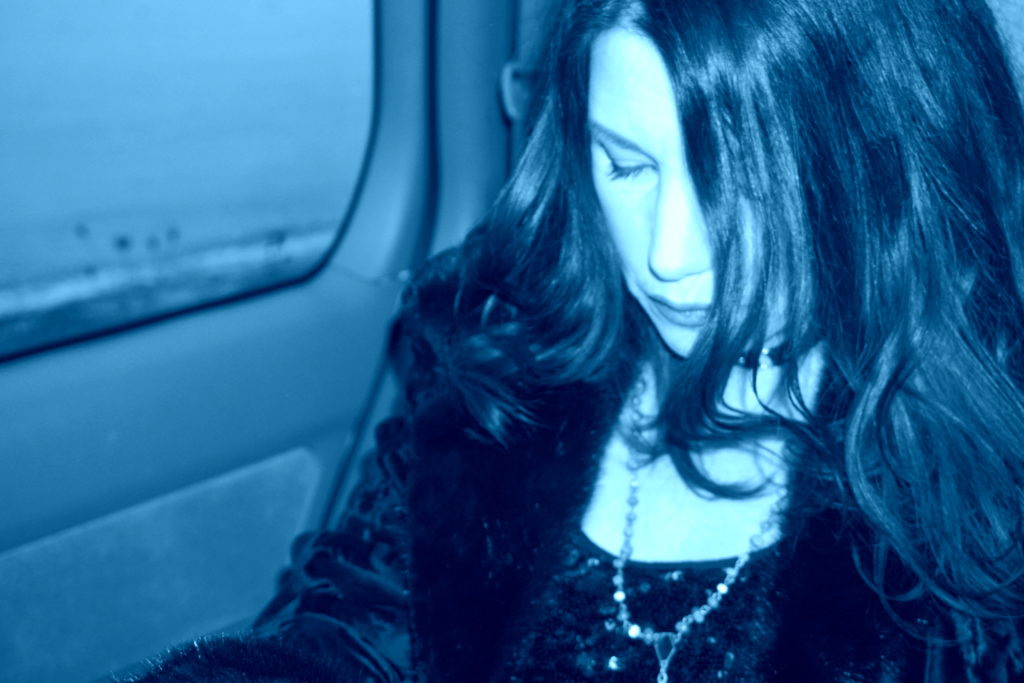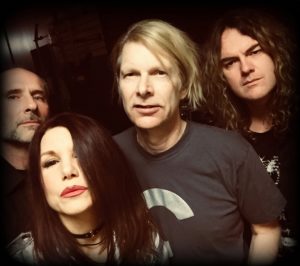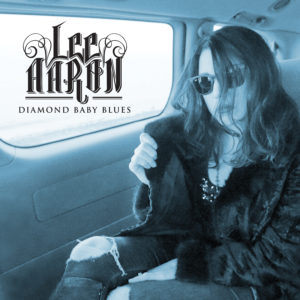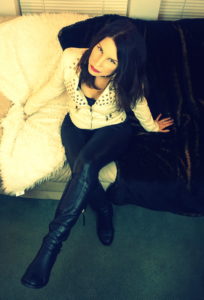
It’s safe to say that Canadian rock legend Lee Aaron is more than just back, she’s back and creating the best music of her career. Her new album, Diamond Baby Blues was released late last month and is a raucous, rocking and genuinely excellent collection of songs that see the artist behind such Canuck hard rock radio staples as Watcha Do to My Body, Metal Queen, Hands On, Only Human, Sweet Talk and Baby Go Round at the peak of her creative powers, and as enthused and energized by her career as she ever has been.
“I am back and making music and am having a lot of fun doing it. The only drag is I am not 20 years old any more. It’s a different environment for making music now. It’s all digital and there are hardly any glossy magazines now. We’re not all in our 20s and so we have different commitments, but the beautiful thing about the industry today is that we can make music on our own terms. More than fifty per cent of the reason to put out records these days, to me, is just the process. It’s the process of writing the songs, of going into the studio, of honing them and perfecting them and having this baby born which is your album,” said Aaron from her home in British Columbia which she shares with her husband and drummer John Cody. The rest of her band is comprised of Toronto-based guitar wizard Sean Kelly (Crash Kelly, Nelly Furtado, Emm Gryner) and veteran west coast bassist Dave Reimer.
“Taking these things that were just little nuggets and glimmers of ideas and then seeing them fully realized into songs with an identity is so much fun and so fulfilling. And then being able to take them out and perform them live to see if we created work that resonates with people is the second part. The last couple of shows we did, we went out and played one of the new songs, American High as our encore tune and people were singing the chorus by the end of the song. To us, that’s the mark of a good track.”
Diamond Baby Blues, by Aaron’s admission, is a more focussed and more collaborative record than her previous outing, the critically and popularly acclaimed Fire and Gasoline. That was her first album in a dozen and her first rock album in 16 years since 2000’s Slick Chick.
“With Fire and Gasoline, we didn’t put any filters on ourselves. Number one, it was the first album that Sean Kelly and I had done some writing together and it was my first album in over a decade and I didn’t want to make a specific type of record, I just wanted to write and see what came out. So, Fire and Gasoline is a little less streamlined stylistically. For this new album we wanted to create something that was a little more focused,” she said, adding that the classic rock-inspired atmosphere for the new album came from the types of covers she was thinking about doing.

It was Kelly who thought Aaron and the rest of the band should enter the studio sooner rather than later and suggested picking a few cover tunes would get the creative ball rolling and lower the workload a bit in terms of writing a full album’s worth of new original material.
“As a songwriter there is a little part of you who is worried that your audience will think you’re copping out by doing covers, although I know that the songwriting within the band is definitely there. I have only done a few covers over my entire 14-album career, the rest of the time I have always written the material. He said that we can still pick a song, deconstruct it and put it back together and make it our own. That’s a challenge in itself, to take a cover and make it your own. I curated a short list of songs that I might be interested in doing and we sort of took it from there and that determined the vibe of the album and we wrote around that vibe,” she said.
“When we looked around at those covers we started writing around the them of hard blues, more organic sounding music. This is the day and age where you cannot turn on the radio and not hear an autotuned vocal. Everything is programmed, so this is literally the kind of music that our youth is growing up with. They’re not hearing bands like Led Zeppelin and Deep Purple and understanding the beauty of what they did. The music of those bands, especially live, was the way jazz and blues music works; its very much a living, breathing entity where you have to be paying attention onstage.
“We have been talking about going a little more in that direction in the lead-up to the new album. We wanted to do music that is unmistakeably written and performed by a real band. There’s real backing vocals on stage, everybody has to be able to play and sing and there’s no click track. We wanted to make an album that was more stripped down than the last one.”
One thing has remained constant throughout Aaron’s music, especially lyrically, is that her songs are written from the point of few of a strong, powerful woman, one who encourages other women to be equally strong and powerful in their lives, their relationships, chosen vocation and every other aspect of life. In the #metoo and #TimesUp era, these songs, as well as the new ones created for Diamond Baby Blues perhaps have greater resonance, although Aaron said she does not set out with an agenda of imbedding a message of empowerment in her songs – it just happens naturally.
“That’s just the way it lands with me through the vetting process for the songs. From a very young age, it was always distasteful to me the way that women were portrayed in the media, and I can say that with confidence because I was one of those women. That was when I went through a period of terrible marketing and I think my bio even says that. I was always fighting against the powers that be saying things like, ‘I don’t really want to wear those red spandex shorts.’ My husband often says to me, ‘well why didn’t you just say no?’ And my only real response was that I was this kid from the suburbs and I was young and naïve and had no experience in that world. I just thought, ‘well I guess they know better than I do. This must be what I am supposed to do.’ But I figured out pretty early on that it wasn’t working for me, nor did I feel it was working for other women,” she said.
 “I have always been about women’s equality and being able to hold your ground, especially in the rock music industry. Because for many years it was very, very dominated by men, not only on the musicianship side of things, but also within the record industry. It’s not so much like that now. I think I just naturally gravitate towards material that just expresses that.
“I have always been about women’s equality and being able to hold your ground, especially in the rock music industry. Because for many years it was very, very dominated by men, not only on the musicianship side of things, but also within the record industry. It’s not so much like that now. I think I just naturally gravitate towards material that just expresses that.
“Did I battle against the misogyny and the sexism of the 1980s and that culture? Absolutely. It’s funny, a couple of European magazines have wanted me to tell them my #metoo moment. Did I have some? Absolutely I did, but I feel that my way of always speaking back against that was through music. And after having a few weird experiences I also realized it was important to understand that you can set boundaries with people – and you need to. Listen, it’s still out bad out there too. When I was making my new record last year, the number one question a lot of people asked my management consultant was ‘what does she look like now?’ That’s sad, because they wouldn’t ask that of a male musician.”
The kick-ass album opener, Diamond Baby sets the tone on so many levels for the album. It demonstrates that Aaron and her band have nailed the 1970s classic rock vibe, as well as the lyrical tone of empowerment that permeates the album and so many previous albums, as discussed above.
“I like to write lyrics that could be open to interpretation by the listener. They are not always so specific. Diamond Baby is about taking your power back. It’s about walking away from a situation that has been toxic or unhealthy and getting up after you’ve been knocked down. It’s a survivor story; it’s about finding your inner power, your inner strength and being a diamond, baby! Everybody is a diamond in the rough.”
The song American High is a rollicking rocker that is already a live concert hit because of its anthemic nature and sing-along chorus. It’s well-crafted track that captures a live-off-the-floor rawness and raggedness, without coming across as either too raw or too ragged.
“It’s interesting; we think we’re in this terrible place with politics and what’s going on in America and Sean and I certainly have had lots of discussions about that. I am not really happy about the way things are, about Trump pulling out of the Paris climate agreement, I could go on and on, but I don’t want to get really political. When Sean sent me the riff, the ‘American High’ idea just came into my head. What if we wrote a song that wasn’t so negative; one that celebrates the things we love about America, the things that really are great about American, but that also hints in the direction that we’re not happy about the new order of things,” Aaron explained.
“I also tried to construct the chorus in a way where it was just easy to sing along to. It’s saying, ‘yeah, it’s a good time to get high.’ High can mean a lot of things. It could mean it’s a good time to protest. It could me it’s a good time to get drunk. Again, the way that I tried to construct the lyrics was to celebrate but disapprove and leave it up to the listener as to however they want to take the meaning of the chorus.”
In the Bedroom continues the naughty but nice song titles that have a deeper meaning than at first glance, in the vein of tunes like Sex with Love, and Hand’s On from Aaron’s back catalogue.
“That’s a little in joke with my husband. John is always saying, ‘okay you need to wear the pants in the family right now.’ Because we are equals, and I have strong opinions about certain things. He is better at certain things and I am better at some things that you might traditionally think are things a man would do in a relationship. It’s written in kind of a cute way and about being in the bedroom, but it’s supposed to be just a song on challenging gender stereotypes. It really doesn’t matter who wears the proverbial pants in the relationship, if it works for people, it works, and that’s the way every successful relationship should work right?”
 Returning to the subject of covers, they are all exceptionally conceived, where Aaron and the band aptly straddle the line between remaining faithful to the original, while putting a unique stamp on them. There is a late-1960s R&B turn on Janet Jackson’s Black Cat, a soulful version of I’m A Woman, originally recorded by Koko Taylor, and a breathtakingly potent take on Linda Ronstadt’s You’re No Good. The highlight for many, including the scribe penning this piece, is the incendiary version of Deep Purple’s Mistreated, which features truly scintillating guitar playing by Sean Kelly and a tour de force vocal performance from Aaron.
Returning to the subject of covers, they are all exceptionally conceived, where Aaron and the band aptly straddle the line between remaining faithful to the original, while putting a unique stamp on them. There is a late-1960s R&B turn on Janet Jackson’s Black Cat, a soulful version of I’m A Woman, originally recorded by Koko Taylor, and a breathtakingly potent take on Linda Ronstadt’s You’re No Good. The highlight for many, including the scribe penning this piece, is the incendiary version of Deep Purple’s Mistreated, which features truly scintillating guitar playing by Sean Kelly and a tour de force vocal performance from Aaron.
“When I was going through a list of covers that I wanted to attempt one of my close friends from Montreal said I should do an old blues rock song from the 1970s that’s like an epic. Take something that’s epic and revamp it. So, I started searching around for an epic and stumbled across the version of the song that featured Deep Purple with Ritchie Blackmore and David Coverdale in a concert from 1974, and it’s got this incredible, vein-popping vocal, but it’s so stripped down, just drums, bass and guitar. But even at that it’s still epic. And I thought, okay this is a song I can work with because there are places we could take it and things we could add,” she said.
“We took the song and started playing it and when I first started singing it I said, ‘okay I sound just like David Coverdale, this is not working.’ So, we took it up a couple of tones and it started to work. We also kept it long because I think we would have done the song a disservice if we had shortened it to three and a half or four minutes. And before we even got into the final stages, I started hearing a sort of epic mellotron kind of keyboard thing happening in it, I heard these background vocals echoing the lead vocal. The whole idea was to take the song and notch it up a couple of levels of epicness, and I hope we accomplished that. The feedback we’ve got, both from the record and from playing it live has been very positive.
“But I have to tell you, it was very challenging because we were wondering how far to we take it from the original that it sounds like a cover, but not take it too far away that it does a disservice to the original and makes a bunch of fans really mad.”
What will make fans really mad – at themselves – is if they don’t get a chance to see Lee Aaron and her talented band performing these songs, as well as other hits from her legacy of great rock tunes, live. Tour dates are still being booked for the summer and into the fall, so it’s advisable to check back to her website regularly.
As for the setlist, it’s going to be a good balance between the old and not so old repertoire.
“I would say almost half of our set is new material from Diamond Baby Blues and Fire and Gasoline. Of course, I am not going to walk away and not do songs like Watcha Do to My Body, but I am not going to continue to play only old songs. I am not satisfied as an artist to do just that. Life is far more interesting for everyone if you’re still creating,” she said.
For more information, visit www.leeaaron.com.
- Jim Barber is a veteran award-winning journalist and author based in Napanee, ON, who has been writing about music and musicians for a quarter of a century. Besides his journalistic endeavours, he now works as a communications and marketing specialist. Contact him at jimbarberwritingservices@gmail.com.
SHARE THIS POST:
